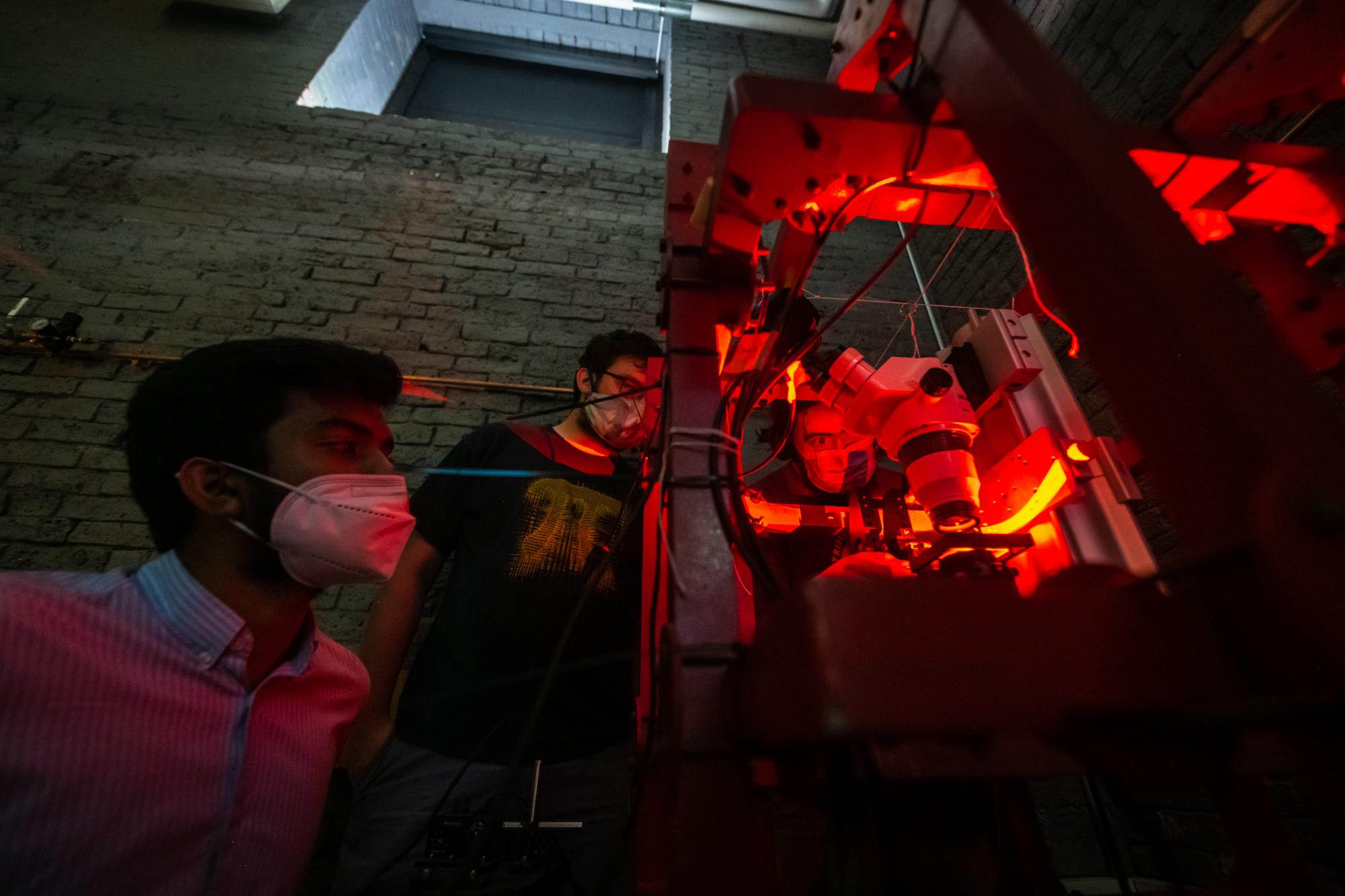Physics Professor Alexander Petroff receives NSF CAREER Award to study the movement of bacteria

Clark University assistant professor of physics Alexander Petroff has received a five-year CAREER Award from the National Science Foundation to support his research on the locomotion of multicellular magnetotactic bacteria — microbial communities that work together to propel themselves along magnetic field lines.
These bacteria, found in muddy areas, live exclusively in “spherical aggregates” that grow, elongate, and divide into two similarly sized aggregates as their cells reproduce. Petroff and his team are working to better understand the physical mechanisms that drive this remarkable behavior.
“A big problem if you’re studying the evolution of multicellularity is understanding how cells know how to position themselves,” Petroff explains. “This is directly related to the way these bacteria are aligning their magnetic moments — trying to figure out who should be pushing and who should be pulling. There is the question of how these cells organize themselves in space.”
Petroff’s project uses a combination of experiment and theory to investigate how the interactions between cells allow them to behave like a single multicellular organism and organize the way they do. By applying a fluorescent dye that attaches to cell walls and makes them glow in the dark, then using a powerful microscope to get a clear picture of their organization, Petroff and his team can create 3D reconstructions of each cell’s position in the colony.
The team will create an image library of 3D reconstructions of cells in their spherical state, as well as when they’re divided. From there, they will study how each cluster of cells is able to move through space.
“Where each cell is situated on the surface of the colony determines whether it should push, pull, or do nothing,” Petroff says. “We don’t really know if all the cells are actively moving the colony, so what we want to do is figure out how these cells are coordinating their motility.
“How we’re going to do that is charmingly simple,” he adds.
When a cell rotates its flagella in water, it pushes against the water and the water pushes back, propelling the cell forward. In their study, Petroff and his team will place microscopic fluorescent beads next to the colony and record how those beads move as the colony swims. The principle, he says, is similar to tossing a stick into a river to determine how fast it flows.
“If we can measure the flow field around these bacterial colonies, we can differentiate between these different strategies and figure out who is doing what,” he says.
Finally, the group will use external cues, such as the presence of oxygen or sunlight, to research how the colonies coordinate their behavior. Each cell uses guesswork to figure out which direction it should be moving. When an external cue signals to that cell that its guesswork is wrong, it reverses that behavior.
“What you can show is if each individual bacterium in the colony does that, the colony as a whole learns how to do magnetotaxis (directional movement in response to a magnetic field),” Petroff says. “We’re going to develop a strategy to figure out the details behind that.”
As part of the CAREER Award, Petroff also will develop a new course, Modeling Biological Complexity, that will focus on tools and techniques for studying and modeling uncultured bacteria, microbial communities, ecosystems, and nutrient cycles. It will also help prepare students to address challenges posed by climate change and ecological collapse.
“Something the science departments do really well at Clark is provide research opportunities for undergraduates, which is an excellent experience for learning the realities of being a physicist or scientist. It also makes it easier to get into grad school — and it can also be an awful lot of fun,” he says.
Petroff’s research group includes graduate student Ben Roque and undergraduates Meherab Hossain ’22, Carlos Hasburn ’22, Aandisha Samara ’21, Oshani Fernando ’22, and Schuyler McDonough ’22.
Previous members included undergraduates Brynna Moran ’21, Marika Fox ’19, Sheila Ford ’19, Alejanda Rosselli Calderon ’20, and Cameron Mitchell ’18.
The National Science Foundation’s prestigious CAREER Awards support junior faculty who exemplify the role of teacher-scholars by integrating research and education in their work.
